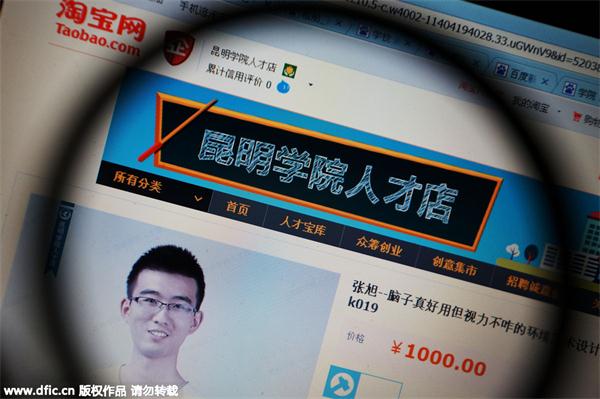 |
|
An online shop, "Kunming University Talent Store", on Taobao, China's largest online shopping website, draw wide public attention by offering 65 Kunming University graduates as its "major products". [Photo/IC] |
An online shop, "Kunming University Talent Store", on Taobao, China's largest online shopping website, has drawn wide public attention by offering 65 Kunming University graduates as its "major products". The graduates have been divided into four categories.
While some people believe using "online sales" to promote college graduates in the job market is a novel concept, others condemn it as commercialization or materialization of students.
What actually the "talent store" has done is put offline campus recruitment online. Universities have always invited employers for campus recruitment. The "talent store" has put up students' profiles online for employers to review. And once employers show interest in some students, the university can arrange for job interviews.
Colleges should not hesitate to try out new methods as long as they help graduates seek employment. But there is also need for colleges to strengthen their individualized career guidance system and guide graduates to appropriate employers.
People are worried because they fear the online graduate promotion will reveal students' personal information and the "talent store" could turn out to be a publicity stunt without any substance.
Media reports, however, indicate Kunming University has done enough homework before putting up the "talent store". For instance, an employer interested in a graduate on the "talent store" has to pay 1,000 yuan ($161) as deposit, following which the university's teachers will verify the facts related to the employer and decide whether it is indeed intent on recruiting, and only then inform the candidate. Once this is done, the employer can conduct basic online or offline interview with the graduate. But whether or not the graduate is recruited, the university will return the 1,000-yuan deposit to the employer after one week.
Different from the traditional way of employers posting recruitment advertisements and candidates applying for the jobs on offer, the online "talent store" promotes the graduates' qualifications and professional qualities, and invites potential employers to contact the graduates through the university.
Whether this method will work depends on whether employers are interested in the graduates. If the graduates meet some employers' requirements, the "talent store" will create a new channel for recruiting talents. Also, the university can know more about what employers are looking for new recruits and thus adjust its teaching method to improve students' professional aptitude to meet employers' demands.
The success of the "talent store" depends on "customer service" through the Internet. In other words, its success depends on the ability of the teachers in charge of the employment program to understand employers' demands and recommend suitable graduates to them.
The online "talent store" can be seen as an individualized career guidance. It's a simple process of promoting talents online. But the chances of graduates actually getting job offers from employers depend on good communication and understanding between the two parties. This in itself is a significant development because teachers in charge of the graduate employment program will provide individualized career guidance to students and effectively promote them to employers.
Individualized career guidance is a weak link in graduate employment programs in China's colleges. According to the Ministry of Education, one teacher offers career guidance to an average 500 graduates in graduate employment programs, which is a poor ratio. Teachers in charge of such programs are too busy with their teaching duties to handle paper work, let alone providing individualized guidance. If the online "talent store" really provides individualized career guidance, it will benefit students looking for jobs. But if the Kunming University only uploads students' information online without making any further efforts, the "talent store" will become a mere promotion stunt.
The online "talent store" is a new way of facilitating graduate employment. But only when a college provides effective and individualized career guidance and services, can it actually help graduates get suitable jobs.
The author is vice-president of the 21st Century Education Research Institute.

I’ve lived in China for quite a considerable time including my graduate school years, travelled and worked in a few cities and still choose my destination taking into consideration the density of smog or PM2.5 particulate matter in the region.